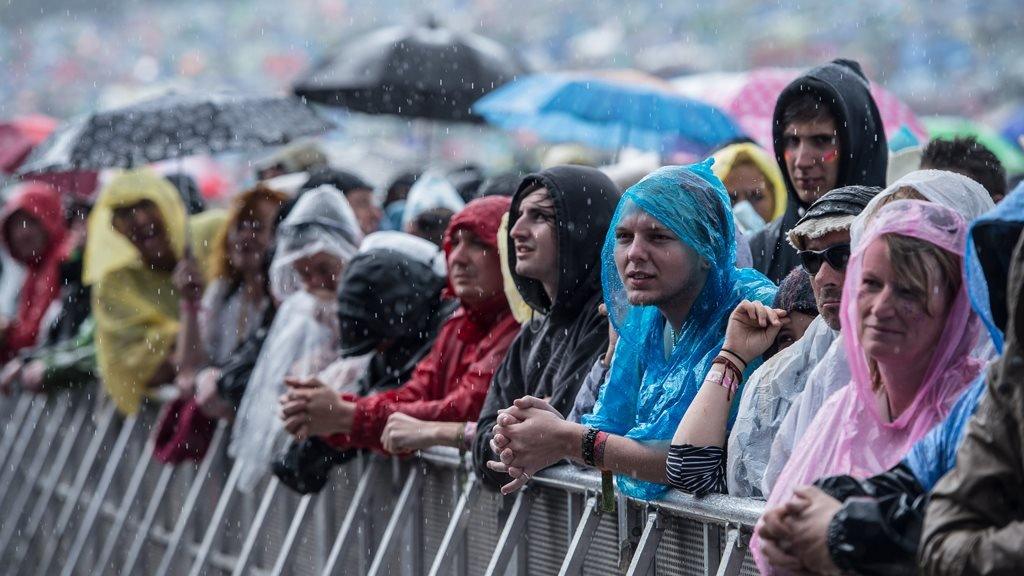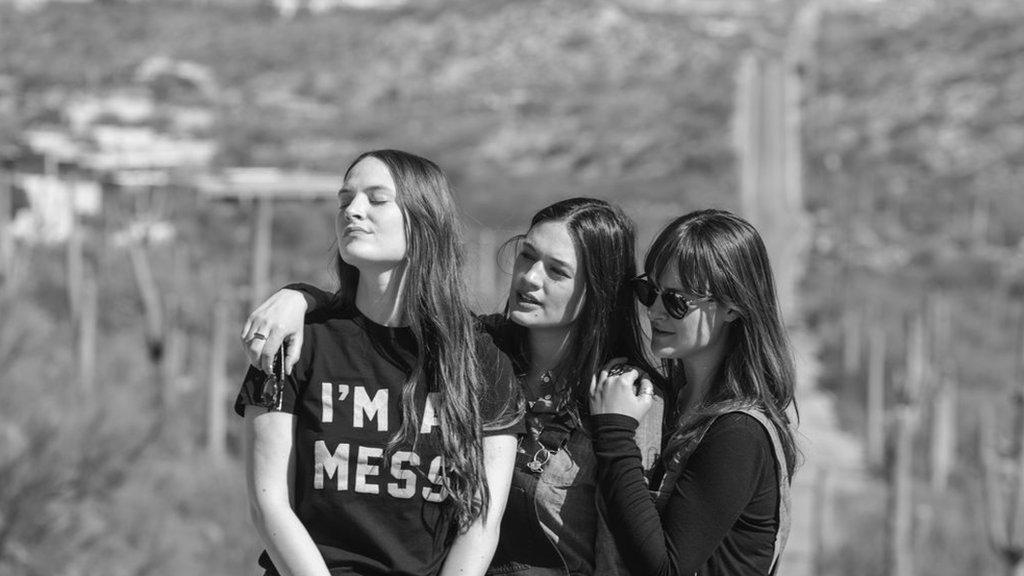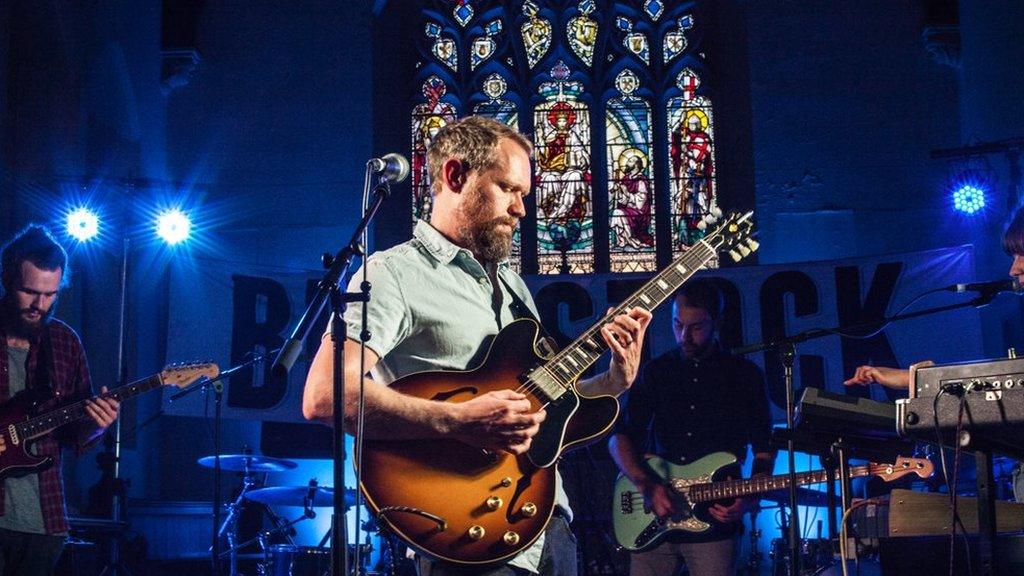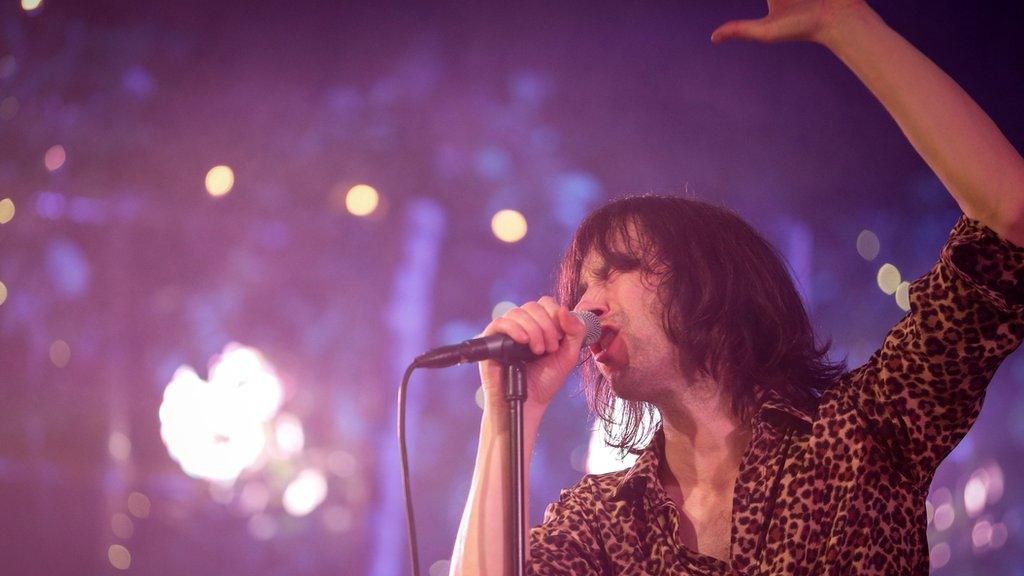Music festivals: Here's one way to stay dry
- Published

This looks like fun
Last summer, on my fourth day of sploshing through Glastonbury's sodden fields, I thought: "Why do I keep doing this to myself?"
Sure, the music was great. Skepta, Adele and Grimes gave unforgettable, once-in-a-lifetime performances; and Philip Glass's Heroes Symphony, an orchestral tribute to David Bowie in the dead of the night, was unexpectedly moving.
Even Coldplay - previously the only band who'd provoked me to walk out of a concert early - won me over, with a spirited, kaleidoscopic set where every song felt big enough to be an encore.
But still, the thought lingered: There must be a better way.
And it turns out I wasn't alone.
The last decade has seen an explosion in city-based festivals, bringing bands to your doorstep, usually with the added benefit of getting to curl up in your own bed (or someone else's, if you prefer) at the end of the day.
"They're springing up absolutely everywhere," says Paul Reed of the Association of Independent Festivals (AIF). "Just within our membership, we've added around eight city-based festivals in the last couple of years."
One of the newest is Bushstock, external, which takes place in Shepherd's Bush. Since it started in 2011, Bushstock has staged early gigs by the likes of Bastille, George Ezra and Michael Kiwanuka in nearby pubs, clubs and railway arches.
"We've had people like Hozier play to 300 people in a church, now he plays in front of tens of thousands of people," says Maz Tappuni, who co-founded the festival from his friend's front room eight years ago.
"We've had Bastille at [local pub] Defector's Weld in front of 200 people in 2013. Now they've played the O2 twice."
Bushstock is a modest event, open to just 1,500 people. But tickets start at just £18, for which fans can see any of the gigs at any of the venues.

The Staves have played Bushstock several times
This year's line-up is headlined by singer-songwriter Nick Mulvey and folk-rock trio The Staves, who are returning from a headline tour of America to play a tiny, intimate show at St Stephen's Church.
For singer Emily Staveley-Taylor, the size of the event is the main attraction.
"Sometimes, playing festivals can feel like a battle, because 50% of the crowd are there to get wrecked," she says.
"I feel that, more and more, the big festivals are becoming an Instagram-fest. At Bushstock, it feels like the focus is music and the people who go there are music fans.
"When you're playing a venue like a church, the acoustics mean you can hear if someone is talking. So when someone's phone goes off, people will glare and tell them to sort their lives out."
For The Defectors' Weld pub, Bushstock has been a shot in the arm during the quiet summer season.
"We have to move all the furniture out, which is something we don't normally do until New Year's Eve," says owner John Da Costa.

Bands like Matthew and the Atlas attracts hundreds of fans to St Stephen's Church
"Then last year, we tried to get a photographer in here and he just couldn't find the space. He had to climb on the tables and chairs to actually get any photos. It was absolutely packed."
The festival has a knock-on effect during the rest of the year, he adds.
"We get fans who go to gigs at the Shepherd's Bush Empire saying, 'we'll definitely come back for a drink here next time, rather than go somewhere else'.
"It's been a good pull for us, and customers returning, absolutely."
While Bushstock remains a relatively small affair, other urban festivals have grown to a size where they rival "greenfield" events like Latitude and Green Man.
Sheffield's Tramlines festival, external started out as a free event in 2009; spread across 17 local venues, with acts including The xx and Reverend and the Makers.
This year, it boasts three purpose-built outdoor venues, where the likes of Primal Scream, The Libertines and Kano will play to 20,000 people.
"As it's grown, I guess people have demanded more," says the festival's co-founder Sarah Nulty.
"We'd get fans saying: 'I bought a ticket to see Billy Bragg, why can't I get in to see him?' and we'd have to say: 'He's playing a 900-capacity venue and you didn't turn up on time - but look at all these other people you can go and see!'
"I guess that's the main reason we moved out of the venues."

Indie legends Primal Scream are the main draw at this year's Tramlines
Despite the cost of building and staffing these new stages, costs have been kept down. Tickets for the three-day event start at £30, rising to a maximum of £45, while kids go free. Glastonbury, by comparison, costs £238.
"We're a good-value ticket but if you then factor in the price of a hotel, it can suddenly become unaffordable," Nulty acknowledges.
"So what we've tried to do is work with student halls that are empty during the summer, so you can still get a bed and a shower while making the festival affordable."
And, just like Bushstock, the Tramlines festival has given the local economy a boost, with up to 70,000 people descending on Sheffield every July.
"The beauty is that the whole city joins in," says Nulty. "So there's almost two festivals - a bit like Edinburgh where there's the main festival and then you have the fringe.
"Some of our fringe venues have massive, massive line-ups. There was a pub last year that put Deap Vally in their beer garden for free, and they had people climbing over the walls to try and get in.
"It helps make the festival feel amazing, but it's also our competition - because it's free."
So, could these urban festivals eventually replace the likes of Reading & Leeds or the Isle of Wight festival?
"There's still a great appetite for that traditional camping experience," says Paul Reed at the AIF. "But metropolitan festivals serve as great incubators for emerging talent.
"People are more open to discovery. Because the line-up is multiple choice, you can just stumble into something or find your new favourite band by chance."
The Staves, meanwhile, are always more likely to say "yes" to a festival with its own roof.
"I've been to festivals in fields where it's been an absolute washout and everyone has left," laughs Emily Staveley-Taylor. "Or you're performing on a stage where the electrics are sparking because of the rain, and you're like, 'What the hell are we doing?
"Why are we staging outdoor festivals in a country where it always rains in the summer?' It's madness to me."
Bushstock takes place on Saturday 10 June, with a line-up including The Staves, The Big Moon and Benjamin Francis Leftwich.
Tramlines runs from Friday 21 to Sunday 23 July, featuring performances from Primal Scream, All Saints, The Libertines and Metronomy.

Follow us on Facebook, external, on Twitter @BBCNewsEnts, external, or on Instagram at bbcnewsents, external. If you have a story suggestion email entertainment.news@bbc.co.uk, external.
